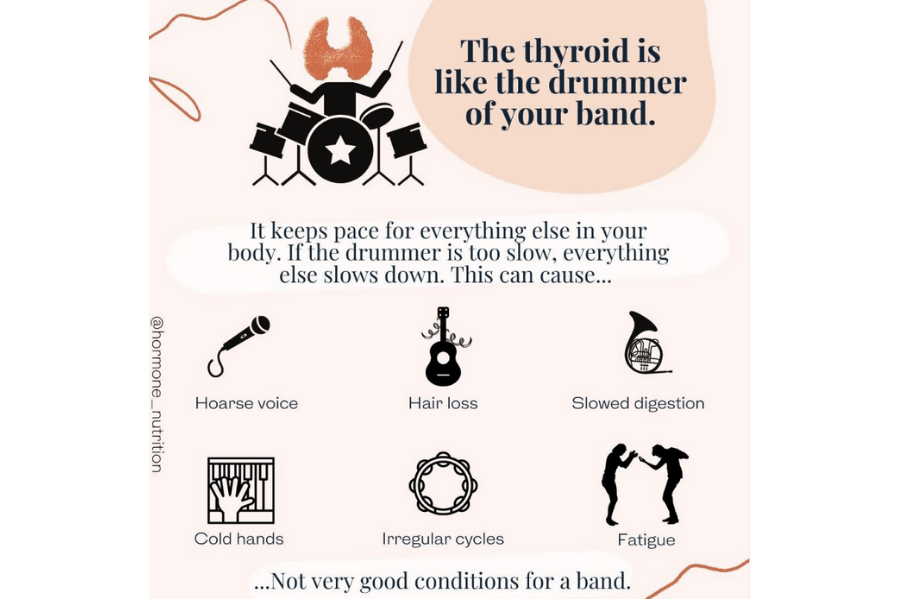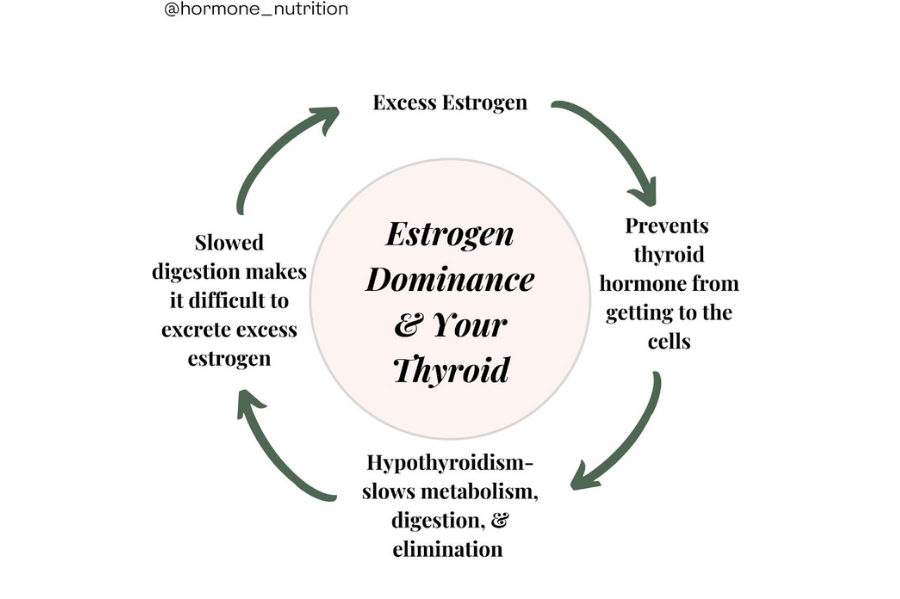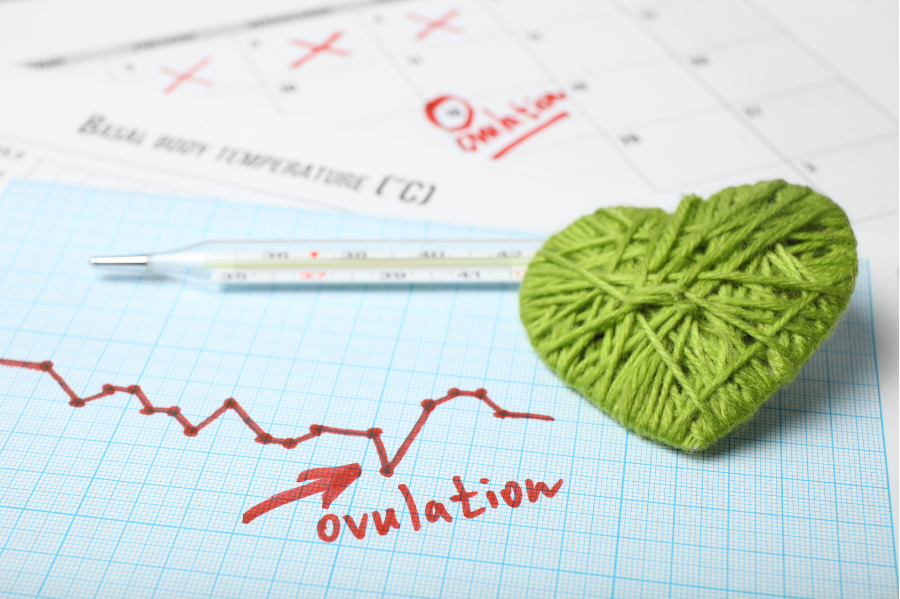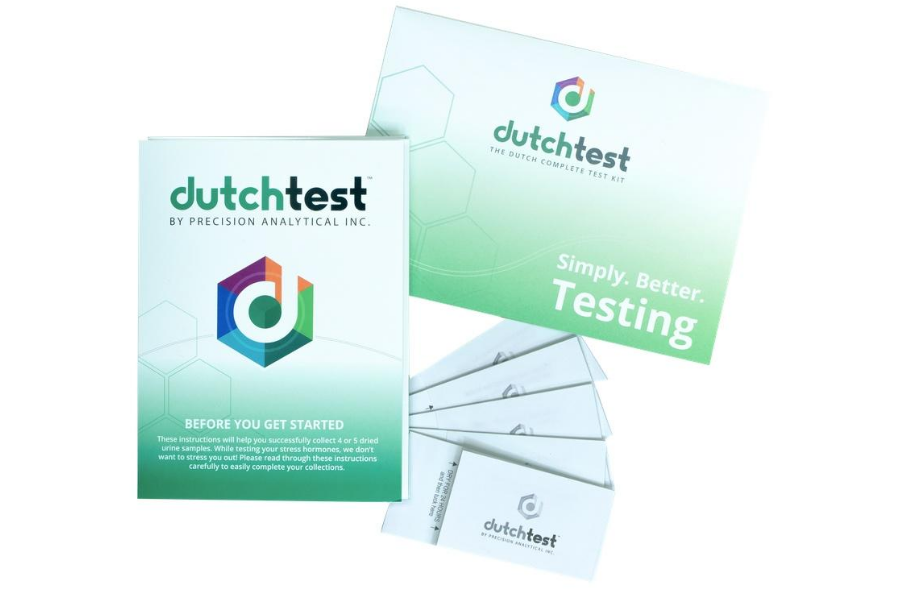What is the thyroid and what does it do?
The thyroid is a small butterfly-shaped gland at the base of the neck. It may sound insignificant, but it’s actually pretty amazing because it produces hormones that are used by nearly every cell in the body. These hormones are basically signals that are sent all throughout the body to regulate the metabolism of each different body system.

Written by Guest Blogger: Laura Dragon, a Registered Dietitian specializing in women’s health, specifically PCOS, fertility, and thyroid conditions.
The thyroid kind of sets the pace for each body system. Think about it this way: your thyroid is the drummer of the band that keeps everything else on beat. It makes sure the digestive system is moving things along as it should, that your menstrual cycle is regular, that your heart beat is normal, that your calories you eat are being burned and used for energy rather than being stored as fat, that your body temperature is normal to keep you from feeling chilly, and so on and so forth.
What happens if the thyroid isn’t functioning properly?
When the thyroid slows down in function, everything else slows down with it. Remember, it’s the drummer and it sets the pace for everything else in the body, so when the drummer slows down, the rest of the band must follow suit!

This means a low functioning thyroid can lead to weight gain, cold hands and feet, irregular menstrual cycles, infertility, slow heart rate, constipation, dry skin, among other symptoms.
The tricky part about this is that these symptoms tend to be pretty vague and may not all show up together or at once. Therefore, getting the right thyroid labs done is crucial for getting a thyroid diagnosis, and I’ll talk more about this later on.
How can hypothyroidism affect your hormones and fertility?
Hypothyroidism can increase prolactin output from your pituitary gland, which suppresses ovulation. Low thyroid function also decreases luteinizing hormone (LH) and follicle stimulating hormone (FSH), which both play critical roles in the development and release of the egg for ovulation.
No ovulation means no progesterone. Low or no progesterone can lead to short cycles, spotting, and increased Chance of miscarriage. It May also lead to estrogen dominance, which can cause heavy periods, pms, breast tenderness, and weight gain.
Since normal body processes are slowing down, this can mean slowed digestion or constipation. Constipation can make it difficult or impossible to remove excess estrogen from the body. Instead, it gets recirculated back into the body, which further exacerbates that progesterone to estrogen imbalance.

Hypothyroidism can also decrease Anti-Müllerian hormone (AMH) which is correlated with decreased egg quantity, which may make it more difficult to get pregnant.
TLDR:
Hypothyroidism can impact everything from your sex hormone levels, to your egg quality and quantity, to your ability to ovulate in the first place. All of these greatly impact fertility.
Even mild cases of hypothyroidism can impact hormones and can also increase miscarriage rates, which is why it’s incredibly important to get your thyroid checked if you suspect this may be contributing to your fertility.
What can you do about it?
If you are struggling with your hormones or fertility, do not worry, you’re not doomed! I have a few recommendations before you go and make any major changes though, just to ensure that the problem is indeed stemming from the thyroid.
STEP 1: TRACK YOUR BASAL BODY TEMPERATURE (BBT).
This is a low-to-no cost option, especially if you’re already tracking your BBT for fertility. Basal body temperature is your body temperature at rest. BBT should be taken first thing in the morning when you wake up. Yes, even before you get out of bed! Tracking and recording this BBT over the course of your cycle can give you an idea what your body temperature is at rest.

If your pre-ovulatory temperature is consistently below 97.0 F, then you may want to do some more testing on your thyroid. Remember how I mentioned that a low body temperature or feeling cold is one symptoms of hypothyroidism? This could be your body’s way of trying to conserve that energy!
STEP 2: GET A FULL THYROID PANEL.
When I say a full thyroid panel, I mean a FULL thyroid panel. Most conventional providers will order a TSH, but nothing else. This does not give the whole picture as to what is going on with your thyroid. It is simply one piece of the puzzle. This is what to ask for in a thyroid panel:
- TSH
- Free T4
- Free T3
- Reverse T3
- TPO Antibodies
- Thyroglobulin
- Antibodies
While I know this may sound like a different language at first, but by getting these additional labs we can determine if your thyroid is producing enough hormone, if your body is activating that hormone, if your body is storing that activated hormone instead of actually using it, and if you’re dealing with an autoimmune condition or not.
STEP 3: TEST YOUR SEX AND ADRENAL HORMONES.
Testing sex and adrenal hormones is a good idea now that we know how interrelated these are with our thyroid hormones.
I personally use the DUTCH test in my practice, which tests estrogen, progesterone, testosterone, cortisol, DHEA, as well as their metabolites, which can help determine where things are going awry along the way.

Getting the right testing can be the key to addressing the root issue of hypothyroidism and infertility. By having the right information, we know exactly what interventions and protocols to use to target the problem at its root, rather than guessing based on symptoms alone.
Few Quick Tips for Thyroid and Fertility Support:
If you’re looking for some quick and dirty tips that everyone can benefit from for thyroid and fertility support, regardless of labs, I’ve got you! These are basic suggestions, but they are the foundation of all hormone balance and should never be taken lightly.
1. Stress management.
Don’t skip over this one! We all have high stress lives, which is why we need to make handling our stressors a daily priority. Go for a walk, meditate, journal, take a bath, listen to music, speak to a therapist, call a friend, do yoga, play with a pet, the list could go on. Whatever it is that helps you handle your stress, do it. And do it often.
2. Sleep 7-9 hours each night.
This goes hand in hand with stress management, but if we’re constantly fighting to stay awake, this is a form of stress. We need to get good quality sleep each night to lower stress levels and improve thyroid function and fertility.
3. Eat enough food, and eat a variety of foods.
The thyroid needs adequate energy and calories to perform its duties, and to produce enough hormones for the body. Without enough food, the metabolism simply can’t operate optimally. Eating a variety of foods throughout the week ensures you’re getting all the different micronutrients. The thyroid requires several micronutrients to do its job. Aiming for 30-50 different foods per week is a good goal to strive for.
4. Moderate movement.
This one will be different for everyone, but the key here is not to stress the body out any more. If you’re not meeting the first 3 tips I just mentioned, then you may not be ready to add in movement. If you’re already doing great with the first 3, then adding in daily movement like walking, cycling, yoga, pilates, or other exercise may be appropriate.
5. Reduce endocrine disrupting chemicals in your environment.
A good place to start to ensure your body is not overrun with chemicals that could be interfering with your thyroid or other hormones is by reducing plastic consumption, eliminating fragrance in beauty and skincare products, drinking filtered water, and eliminating non-stick pans.
6. Trial gluten-free.
This is something that might be appropriate if you know you’re dealing with an autoimmune thyroid condition such as Hashimoto’s. There is some research that suggests eliminating gluten may help reduce thyroid antibodies and help improve symptoms. It’s a good idea to work with a dietitian when trialing an elimination to make sure you’re making healthful swaps.
What You Can Do Now:
If you’re struggling with infertility or hypothyroidism, just know that there is hope! Working with a qualified professional ensures that you can get the right testing done in order to feel better and see results. Click here if you’re interested in applying to work with me as a one-on-one client.
I also created my Thyroid Support Workbook, which is a step-by-step guide to walk you through how to support your thyroid. It provides journal prompts, action steps, nutrition tips, recipes, and a supplement guide. Click here to purchase a copy of the e-book!
Guest Blogger,
Laura Dragon
Laura is a Registered Dietitian specializing in women’s health, specifically PCOS, fertility, and thyroid conditions. She has her own personal experience with hormonal imbalances and a thyroid condition which sparked her interest in the world of hormones. She also worked in a primary care office where she saw countless other women dealing with similar issues who were frustrated with the lack of nutrition advice they were given. Laura has since made it her mission to help other women dealing with hormonal imbalances by providing them with the most comprehensive nutrition care possible without restrictive diets. Her goal is to arm women with the tools and information they need to nourish their bodies, have more energy, regulate their cycles, and optimize fertility.
P.S. Catch Laura’s interview in this week’s episode of The Hormone P.U.Z.Z.L.E Podcast. You can also find the episode on this podcast page as well as Spotify, and Stitcher. Don’t forget to subscribe, follow, and write us a review on Apple Podcast (if you LOVE it).



